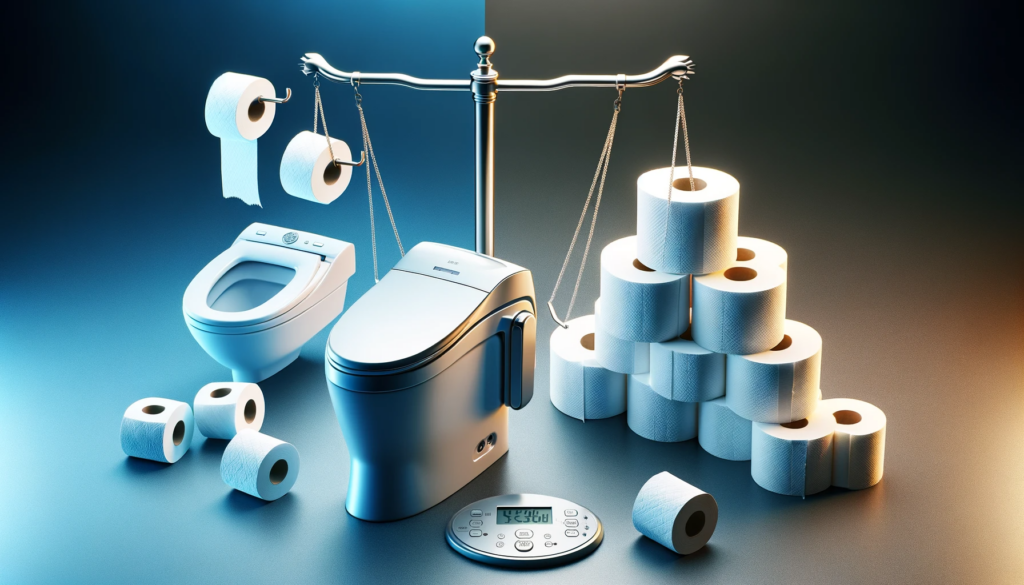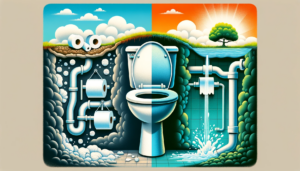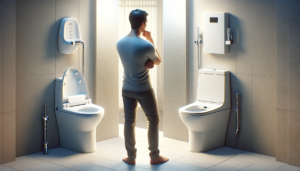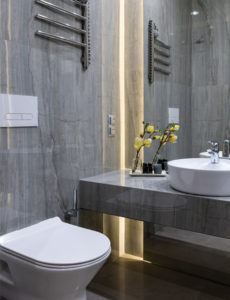Bidé vs. TP: The Cost Showdown – Is a Fresh Bottom Worth the Investment?
In the debate of bidets versus toilet paper (TP), it’s not just about personal hygiene but also about the cost-effectiveness and environmental impact. As more Australians become aware of the benefits of using a bidet, it’s important to evaluate whether this modern bathroom essential is a worthwhile investment.
- The Upfront Cost: Bidet vs. Toilet Paper
Initially, purchasing a bidet involves a higher upfront cost compared to buying a pack of toilet paper. However, when considering long-term expenses, bidets offer a cost-effective solution. High-quality bidet models are durable and require minimal maintenance, contrasting with the continuous purchase of toilet paper rolls.
- Long-Term Savings with a Bidet
Over the long term, the investment in a bidet pays off. The reduced need for toilet paper leads to significant savings. For families or individuals who frequently buy premium or sensitive skin-friendly toilet paper, switching to a bidet can result in even more noticeable cost reductions.
- Reduced Plumbing Issues and Costs
Using less toilet paper not only benefits the environment but also your plumbing. Toilet paper can lead to clogged pipes and sewage issues, which can be costly to fix. A bidet minimizes the risk of these problems, potentially saving you money on plumbing services.
Unroll Your Savings
Switching to a bidet can significantly reduce the need for traditional toilet paper. A bidet user typically experiences a dramatic decrease in toilet paper usage, leading to substantial savings. With the average Australian household spending a notable amount annually on rolls of toilet paper, the switch to a bidet can eliminate this recurring cost. Over time, the savings can be substantial.
- Minimized Toilet Paper Usage
Bidets drastically reduce toilet paper usage. While some may still use a small amount for drying purposes, the quantity is significantly less than what’s used for cleaning. This reduction translates directly into savings on your grocery bill.
- Economical for Large Households
For large households, the savings are even more pronounced. The cost of buying bulk toilet paper frequently can add up quickly. A bidet can eliminate this recurring expense, making it a wise choice for families and shared living spaces.
- The Environmental Cost of Toilet Paper
The production of toilet paper involves deforestation, water usage, and chemical processing. By reducing your toilet paper consumption, you’re not only saving money but also contributing to a more sustainable and eco-friendly lifestyle.
From Rolls to Rinse
Bidets are not only cost-effective but also environmentally friendly. Reduced toilet paper use means fewer trees cut down for TP production. Moreover, bidet toilet seats are designed to be added to your existing toilet, minimizing waste and the need for new bathroom fixtures.
- Lower Environmental Impact
- The environmental impact of manufacturing and disposing of toilet paper is significant. Bidets offer a more sustainable alternative, using a small amount of water and eliminating the need for paper.
- The Eco-Friendly Manufacturing of Bidets
- Many bidet models are designed with sustainability in mind. Manufacturers often use eco-friendly materials and processes, enhancing their appeal to environmentally conscious consumers.
- Reducing Household Waste
- Apart from reducing toilet paper usage, bidets also contribute to less household waste. This reduction in waste not only benefits the environment but can also decrease municipal waste management costs, indirectly saving money for communities.
- Longevity and Durability
- High-quality bidet models are designed for longevity, reducing the need for frequent replacements. This durability is not only cost-effective but also reduces waste and environmental impact over time.
- Promoting Water Conservation
- Although bidets use water, the amount is significantly less compared to the water used in the production of toilet paper. By choosing a bidet, you’re opting for a more efficient and environmentally friendly method of personal hygiene.
Bidé Bliss on a Budget

- Compact Bidet Attachments: These are simple, no-frills attachments that can be added to your existing toilet. They provide a basic wash function, perfect for those looking to try out a bidet without a significant investment.
- Handheld Bidet Sprayers: A versatile and cost-effective option, handheld sprayers offer control and simplicity. They are easy to install and use, making them a popular choice for budget-conscious households.
- Non-Electric Bidet Seats: These bidet seats operate without electricity and offer a range of features like dual nozzles for front and rear wash, adjustable water pressure, and even a self-cleaning function.
- Portable Bidets: Ideal for travel or for those not ready to commit to a full installation. Portable bidets are compact, eco-friendly, and can be used with any standard toilet.
- Eco-Friendly Bidet Converters: These are eco-friendly options that convert your existing toilet into a bidet. They are affordable, easy to install, and significantly reduce toilet paper usage.
From high-end bidet toilet seats with multiple features to simple, inexpensive attachments, there’s a bidet option for every home. This flexibility ensures that personal hygiene and comfort can be enhanced without breaking the bank.
Wash Away Waste, Wash Away Expenses
The environmental impact of bidets extends beyond saving trees.
- Reduced Plumbing Issues: Bidets help to prevent clogs and plumbing issues caused by toilet paper, leading to lower maintenance costs.
- Sustainability Savings: Using a bidet reduces the environmental impact and the costs associated with the production and disposal of toilet paper.
- Energy Efficient Models: Many bidet models are designed to be energy-efficient, using minimal electricity and water, thus reducing utility bills.
- Longevity and Durability: High-quality bidets are built to last, meaning a one-time investment can serve you for years, unlike the recurring expense of toilet paper.
- Health Cost Reduction: By providing a more hygienic clean, bidets can reduce the need for treatments for skin irritations and other conditions caused by toilet paper.
Beyond Just Hygiene
- Sensitive Skin Care Savings: Bidets are a boon for those with sensitive skin, reducing the need for costly skin treatments and special toilet paper.
- Long-Term Health Benefits: Regular bidet use can help prevent certain health issues, potentially reducing medical expenses related to conditions like hemorrhoids.
- Reduced Dependency on Paper Products: By cutting down on the amount of toilet paper needed, households save money and contribute to a more environmentally friendly lifestyle.
- Enhanced Personal Hygiene: Improved hygiene means less susceptibility to infections, potentially reducing healthcare costs.
- Customizable Features for Health Benefits: Many bidet models offer customizable features like adjustable water temperature and pressure, which can have therapeutic benefits, adding value beyond just cleansing.
Invest in Your Tush, Invest in Your Wallet
The decision to adopt a bidet in your household goes beyond just comfort and hygiene; it’s a savvy financial strategy with long-term benefits. Here’s why investing in a bidet is a smart move for your wallet:
- Reduced Expenditure on Toilet Paper: With a bidet, the need for toilet paper plummets. This is a direct cost saving, as the average family can spend hundreds of dollars per year on toilet paper alone. Over time, these savings add up, making the bidet an economically sound choice.
- Longevity and Durability: Quality bidet models are designed for long-term use. Unlike toilet paper, which is a recurring expense, a bidet is a one-time investment that can serve you for years, reducing the need for frequent replacements or repairs.
- Healthcare Cost Reduction: For those with conditions like hemorrhoids or sensitive skin, bidets offer a gentle cleaning alternative. This can lead to fewer doctor visits and less spending on related healthcare products.
- Energy and Water Savings: Modern bidets are designed to be energy-efficient and use minimal water. This translates to lower utility bills, contributing to overall household savings.
- Increased Home Value: Installing a bidet can be a selling point for your property, potentially increasing its market value. This aspect is often overlooked but is a significant financial benefit in the long run.
The Bidé Budget Bonus
Ultimately, bidets offer a twofold benefit – they save you money and are environmentally friendly. Whether you’re considering a high-end model or a basic attachment, the transition from traditional toilet paper to a bidet can be a financially and ecologically sound decision.Here’s how this bathroom upgrade can lead to financial savings and environmental benefits:
-
- Environmental Impact: A bidet’s reduced toilet paper use has a direct positive impact on the environment. Fewer trees are cut down, and there’s less strain on waste management systems.
- Long Term Cost-Efficiency: Over the years, the cost of maintaining a bidet is significantly lower compared to the ongoing purchase of toilet paper. This long-term cost efficiency is a key financial benefit of bidet installation.
- Reduced Plumbing Issues: Toilet paper can cause clogs and sewage issues. By decreasing toilet paper usage, bidets help prevent these problems, saving on potential plumbing costs.
- Eco-Friendly Models: Many bidet models are environmentally friendly, designed to conserve water and energy, which aligns with a sustainable lifestyle and reduces utility bills.
- Hygienic Benefits: The use of a bidet improves personal hygiene, which can reduce the risk of infections and associated medical costs. This is especially beneficial for bidet users with specific health conditions.
The switch from toilet paper to a bidet is not just a matter of personal preference, but also a smart financial and environmental choice. With the potential to significantly reduce household expenses and environmental impact, a bidet is more than just a bathroom upgrade – it’s a lifestyle change. Join the bidet revolution and experience the benefits firsthand!




